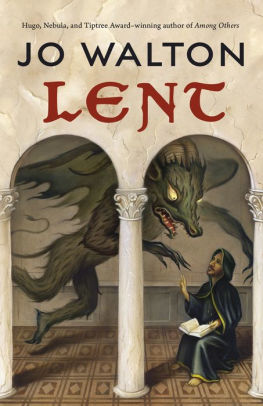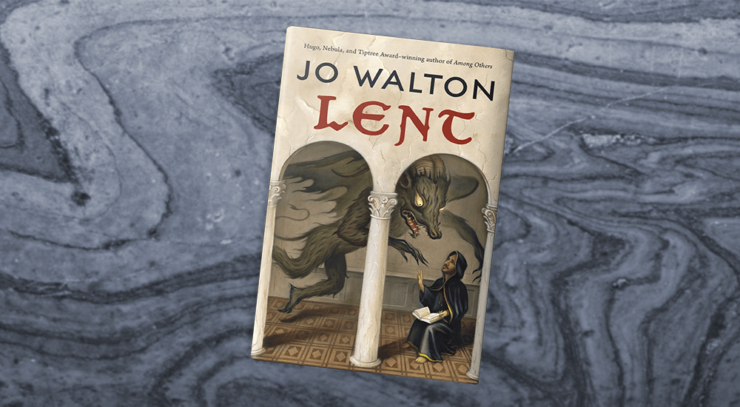Ever since I visited Florence in 2011, Florence has made it into whatever I’ve been writing, even when it’s set on a generation starship, or in Heaven, or in Plato’s Republic. Modern Florence got into My Real Children. But Lent is my Renaissance Florence book, and I went to Florence and stayed there for a couple of months when I was writing it. I went to the places where the book is set—the very rooms, as often as I could, which was a wonderful experience. Most of the places in most of my books are real, but sometimes they’re places where I haven’t been for a long time, and being able to actually pace out scenes and look out of real windows to see what the characters would be able to see was remarkably helpful, as well as fun.
I’ve just come back from Chicago, where I’ve been helping out with the 2019 iteration of the Papal Election of 1492. Ada Palmer, a Renaissance person in all senses of the word, in addition to being a top-notch science fiction writer and an excellent composer, is also a professor of Renaissance History at the University of Chicago. Every time she runs her Renaissance History immersion course, it includes a two week simulation of the papal election—it’s slowly been getting more and more complex, and now has detailed character sheets, full costuming, fifty-three players, and about thirty people helping out. It happens halfway through the course, when Ada has given students enough background, in lecture and reading, for them to do it. It’s amazing, and as with language immersion, at the end of the two weeks of actually using history, the students understand it far better than they ever could from a classroom situation. One of the things they do is to write letters, in character. These can be to each other, or to other historical figures. That’s where the volunteers come in. Ada is amazing, on top of the whole thing, while I, along with other volunteers (some writers, some gamers, many of them students who have taken the course in earlier years) join her in writing replies to those letters. We get into the heads of historical characters as needed to write back fast to the kings and cardinals and functionaries who are poised on the cusp of history and whose actions change the world. The letters are then printed out on parchment paper and sealed with wax seals, to complete the authentic feel.
This is a lot of work, but also a ton of fun, and the first thing it has to do with Lent is that I first wrote Savonarola’s POV for the papal election in 2014. It was in 2015 when I was reading Weinstein’s biography of Savonarola as research for papal election-related stuff that I had the idea for Lent. (I’d already read two other biographies of Savonarola before that point. Who reads just one biography? I like doing research, and reading is always fun.) I remember the exact moment when the novel fell into my head. I was in Cha Noir, a tea house in Verdun, reading the biography while waiting for a friend, and I read a letter from Ficino quoted in it and the whole thing cascaded in my mind with all its implications and was there.
Buy the Book


Lent
Lent is a historical fantasy set in Florence and Hell between 1492 and 1498, pretty much. It’s not set in real Italian history so much as the universe the people at the time thought they were living in, with demons and saints very real presences that intervene in the world. Thus when a contemporary diary entry says that Savonarola went to a nunnery and cast out demons, in chapter one of my book he goes to the nunnery and the demons are really there. Fantasy lets you do that, as it lets you manipulate the metaphysics of the universe to fit what (some) people believed it was.
Oh, and it’s a standalone book, no sequels forthcoming, just this one complete thing. My plan is to stick to that in future. Sequels are harder.
I’d used some of the historical characters from 1490s Florence already in the Thessaly books, when I’d taken them to Plato’s Republic. I wasn’t about to let that stop me using them again in their proper context, and in a very different and completely separate metaphysical universe.
The other way the papal election simulation inspired Lent is that the events of the simulation turn out differently each time. There’s always an election, and a pope, and there’s always a war at the end, but the details are always different, because individual actions matter and the students always do different things and make different choices. I’ve always been interested in alternate history—indeed, four of my previous novels are alternate history. But in Lent I’ve done something more with iterated history, history repeating itself, history playing as variations on a theme, the whole Groundhog Day/Replay thing. The first time through it’s pretty close to what really historically happened, give or take a few demons and the holy grail. After that it starts getting more interesting.
So I get my ideas from visiting Florence, and helping out repeatedly with papal election simulations, and reading history, and drinking tea, of course. At least, that’s where I got this particular idea. I got the idea for Or What You Will… but that’s next year’s book; I’ll save that for next time.
Lent is available May 28th from Tor Books.
Read an excerpt here.
Jo Walton is a science fiction and fantasy writer. She’s published two collections of Tor.com pieces, three poetry collections, a short story collection and thirteen novels, including the Hugo and Nebula winning Among Others. Her fourteenth novel, Lent, is coming out from Tor on May 28th 2019. She reads a lot, and blogs about it here irregularly. She comes from Wales but lives in Montreal. She plans to live to be 99 and write a book every year.










